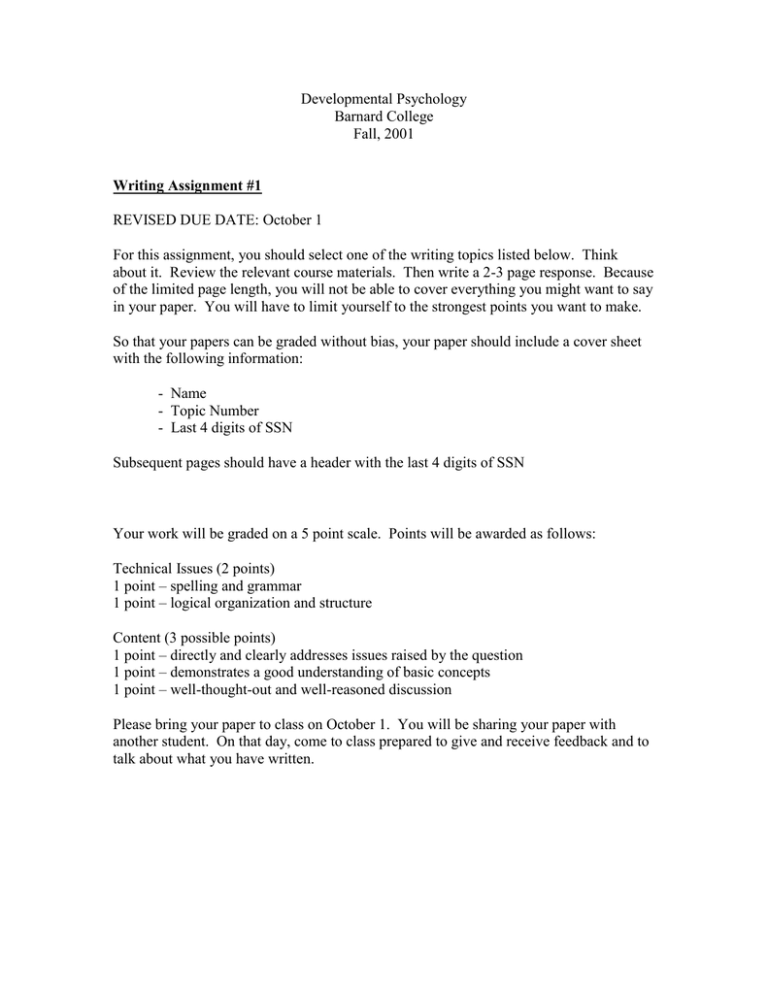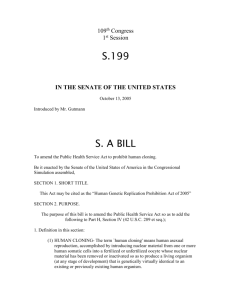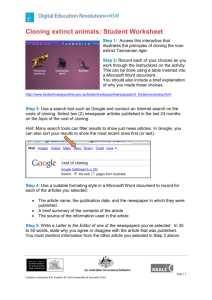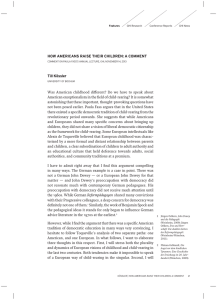Developmental Psychology Barnard College Fall, 2001
advertisement

Developmental Psychology Barnard College Fall, 2001 Writing Assignment #1 REVISED DUE DATE: October 1 For this assignment, you should select one of the writing topics listed below. Think about it. Review the relevant course materials. Then write a 2-3 page response. Because of the limited page length, you will not be able to cover everything you might want to say in your paper. You will have to limit yourself to the strongest points you want to make. So that your papers can be graded without bias, your paper should include a cover sheet with the following information: - Name - Topic Number - Last 4 digits of SSN Subsequent pages should have a header with the last 4 digits of SSN Your work will be graded on a 5 point scale. Points will be awarded as follows: Technical Issues (2 points) 1 point – spelling and grammar 1 point – logical organization and structure Content (3 possible points) 1 point – directly and clearly addresses issues raised by the question 1 point – demonstrates a good understanding of basic concepts 1 point – well-thought-out and well-reasoned discussion Please bring your paper to class on October 1. You will be sharing your paper with another student. On that day, come to class prepared to give and receive feedback and to talk about what you have written. Topics: 1. Identify a behavioral tendency that you believe you have inherited (one that is determined, at least in part, by your genetic make-up). In what ways do you think this trait has been affected by your environment? In what ways has your environment been influenced by your genetic make-up, as related to this behavioral tendency? Be sure to consider the three types of genotype-environmental correlations discussed in class – passive, evocative and active (niche-picking) genotype-environment correlations. What does this type of evidence suggest about the nature-nurture debate? 2. Talk to two different women who have given birth. Try to find two women who are at least 15 years different in age. Ask them about their pregnancy experiences. As part of your conversation, ask about how they modified their behavior during pregnancy to improve the prenatal environment (e.g., avoiding teratogens, changing eating habits, stimulating the baby in utero). In your paper, discuss how changes in scientific understanding of prenatal development influences how people behave when they are pregnant. If possible illustrate your points using examples from your conversations as well as with examples from your reading. 3. At the present time, cloning humans is illegal in the United States. Given your understanding of cloning, do you think this is an appropriate social policy? Include a discussion of the issues raised in Segal’s article on intergenerational cloning as well as pertinent ethical issues. 4. If possible, talk to your parents about how they got you to be “on a schedule” when you were an infant and what impact that had on their relationship with you. In your paper, discuss how the child-rearing practices in your community prepare (or fail to prepare) infants for the expectations of your community. Consider the contrast between the child-rearing practices in your community and those of the Zambian women described by Brazelton et. al. 5. You may develop your own topic. If you wish to do so, please submit the topic to me for approval by Sept. 26. If you develop your own topic, please include in your paper an additional page describing the topic in full.



